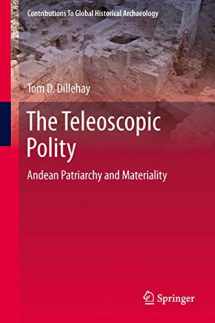
The Teleoscopic Polity: Andean Patriarchy and Materiality (Contributions To Global Historical Archaeology, 38)
ISBN-13:
9783319031279
ISBN-10:
3319031279
Edition:
2014
Author:
Tom D. Dillehay
Publication date:
2014
Publisher:
Springer
Format:
Hardcover
415 pages
Category:
South America
,
European History
,
Anthropology
,
Behavioral Sciences
,
Sociology
,
Americas History
FREE US shipping
Book details
ISBN-13:
9783319031279
ISBN-10:
3319031279
Edition:
2014
Author:
Tom D. Dillehay
Publication date:
2014
Publisher:
Springer
Format:
Hardcover
415 pages
Category:
South America
,
European History
,
Anthropology
,
Behavioral Sciences
,
Sociology
,
Americas History
Summary
The Teleoscopic Polity: Andean Patriarchy and Materiality (Contributions To Global Historical Archaeology, 38) (ISBN-13: 9783319031279 and ISBN-10: 3319031279), written by authors
Tom D. Dillehay, was published by Springer in 2014.
With an overall rating of 3.8 stars, it's a notable title among other
South America
(European History, Anthropology, Behavioral Sciences, Sociology, Americas History) books. You can easily purchase or rent The Teleoscopic Polity: Andean Patriarchy and Materiality (Contributions To Global Historical Archaeology, 38) (Hardcover) from BooksRun,
along with many other new and used
South America
books
and textbooks.
And, if you're looking to sell your copy, our current buyback offer is $0.3.
Description
This volume provides an up-to-date and in-depth summary and analysis of the political practices of pre-Columbian communities of the Araucanians or Mapuche of south-central Chile and adjacent regions. This synthesis draws upon the empirical record documented in original research, as well as a critical examination of previous studies. By applying both archaeological and ethnohistorical approaches, the latter including ethnography, this volume distinguishes itself from many other studies that explore South American archaeology. Archaeological and traditional-historical narratives of the pre-European past are considered in their own terms and for the extent to which they can be integrated in order to provide a more rounded and realistic understanding than otherwise of the origins and courses of ecological, economic, social and political changes in south-central Chile from late pre-Hispanic times, through the contact period and up to Chile’s independence from Spain (ca. AD 1450-1810). Both the approach and the results are discussed in the light of similar situations elsewhere.Throughout its treatment, the volume continually comes back to two central questions: (1) how did the varied practices, institutions and worldviews of the Mapuche’s ancient communities emerge as a historical process that resisted the Spanish empire for more than 250 years? and (2) how were these communities reproduced and transformed in the face of ongoing culture contact and landscape change during the early Colonial period? These questions are considered in light of contemporary theoretical concepts regarding practice, landscape, environment, social organization, materiality and community that will make the book relevant for students and scholars interested in similar processes elsewhere.


We would LOVE it if you could help us and other readers by reviewing the book
Book review

Congratulations! We have received your book review.
{user}
{createdAt}
by {truncated_author}


